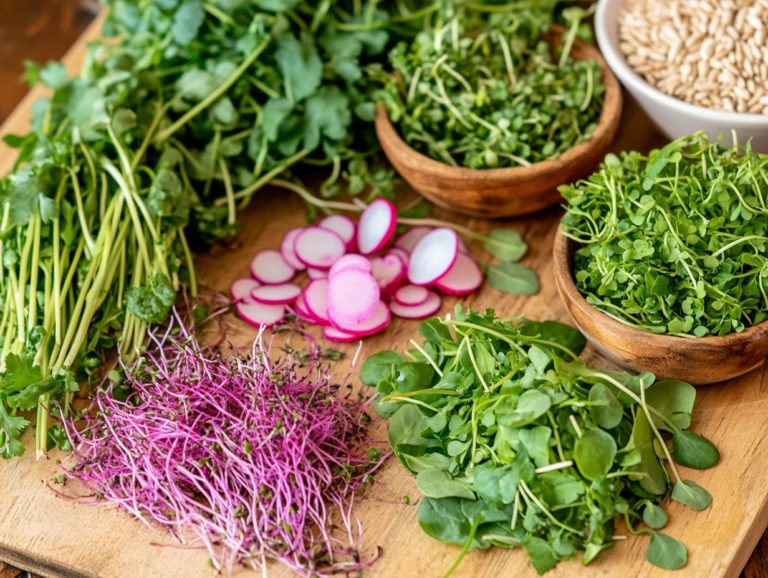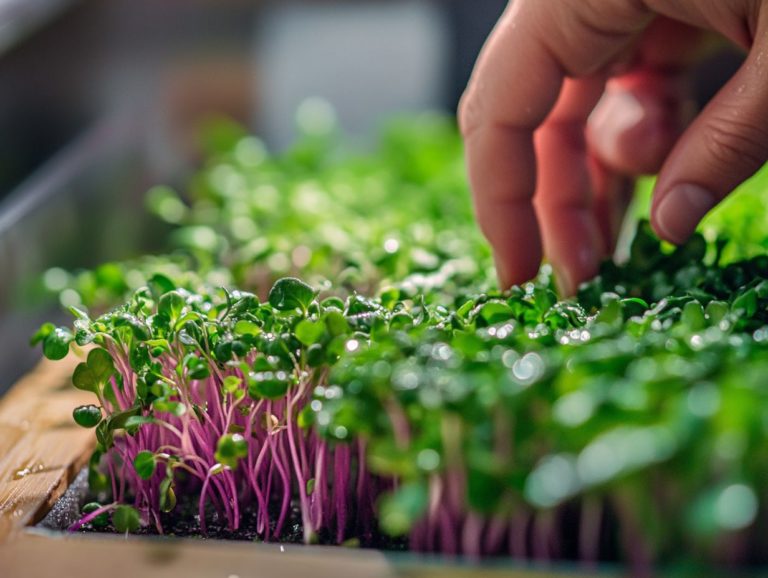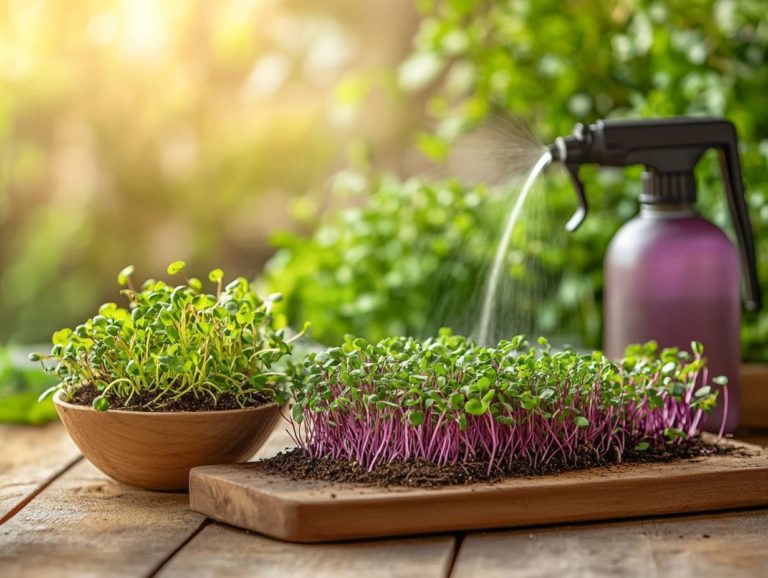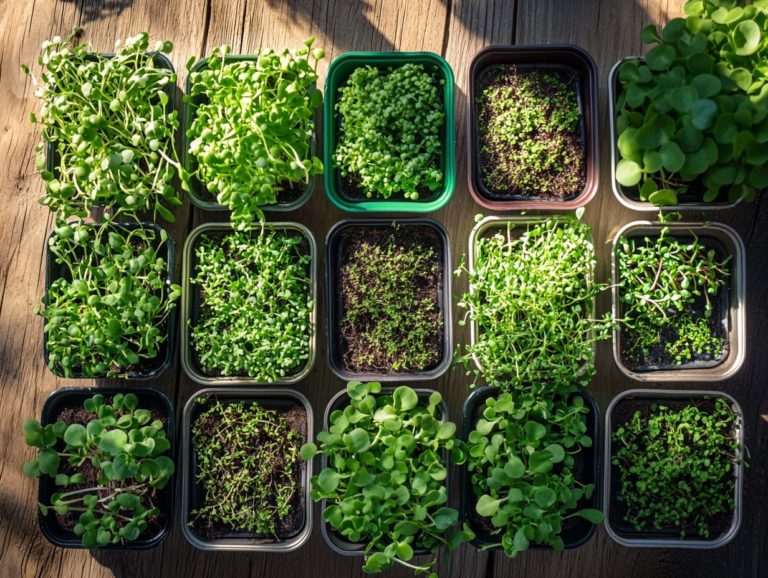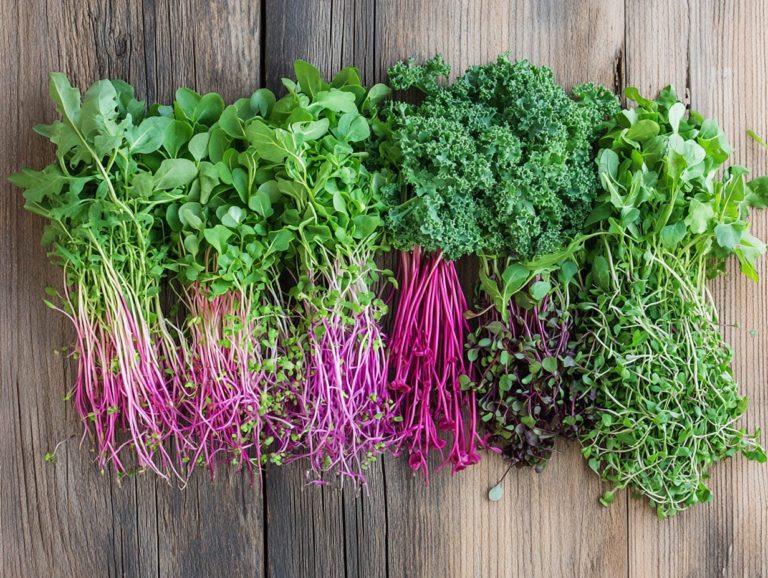5 Microgreens for Boosting Cognitive Function
Microgreens are more than just trendy garnishes. They offer remarkable nutritional value that can enhance your brain health.
In this article, you ll discover what microgreens are and how they can elevate your cognitive function. Varieties such as broccoli, sunflower, and kale microgreens each offer distinct advantages worth exploring.
Find out how to seamlessly integrate these vibrant greens into your diet for maximum health benefits.
Get ready to supercharge your brainpower! Delve into the details to learn more!
Contents
- Key Takeaways:
- 1. What Are Microgreens?
- 2. Benefits of Microgreens for Cognitive Function
- 3. Broccoli Microgreens
- 4. Sunflower Microgreens
- 5. Radish Microgreens
- 6. Pea Shoot Microgreens
- 7. Wheatgrass Microgreens
- 8. Kale Microgreens
- 9. Cilantro Microgreens
- 10. Spinach Microgreens
- 11. Arugula Microgreens
- 12. Beet Microgreens
- 13. Mustard Microgreens
- 14. Cabbage Microgreens
- 15. How to Incorporate Microgreens into Your Diet for Cognitive Benefits?
- Frequently Asked Questions
- What are microgreens and how can they boost cognitive function?
- Which 5 microgreens are recommended for boosting cognitive function?
- How do antioxidants in microgreens help with cognitive function?
- Can microgreens help with age-related cognitive decline?
- Are there any other benefits of consuming microgreens for cognitive performance?
- How can I incorporate microgreens into my diet to reap their cognitive benefits?
Key Takeaways:
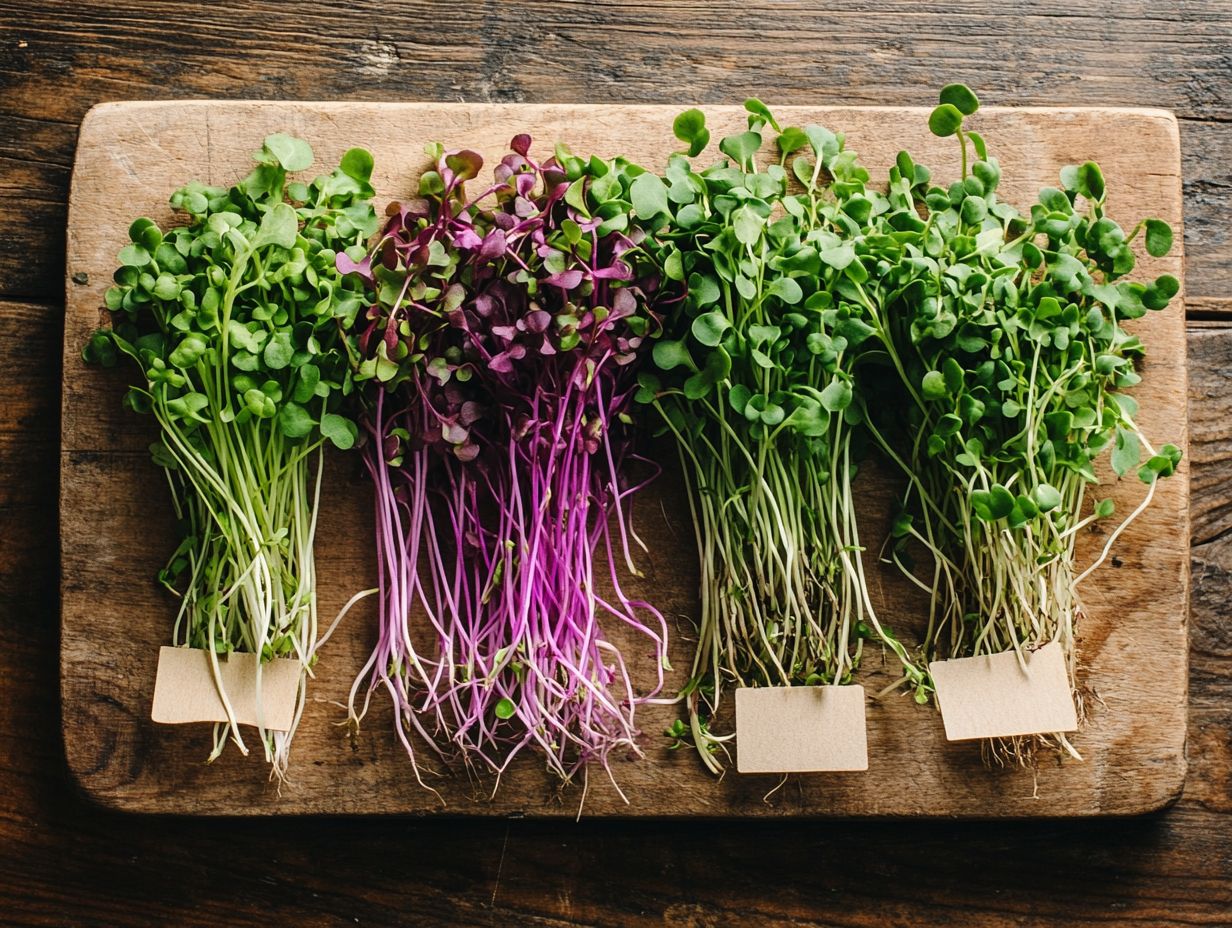
- Microgreens can boost cognitive function because of their high nutritional value.
- Top varieties include broccoli, sunflower, radish, pea shoot, and wheatgrass microgreens.
- They are easy to grow and can enhance salads, sandwiches, smoothies, and more.
1. What Are Microgreens?
Microgreens are those small, nutrient-packed plants you can harvest at an early stage typically within 7 to 21 days of germination. They are a great source of vitamins, minerals, and antioxidants, making them a favorite among health-conscious folks and registered dietitians.
Their benefits are numerous, and their versatility in enhancing various dishes is simply unmatched.
These tiny greens include various species, from radish and beet to basil and sunflower, each adding its own unique flavor and texture to your meals. Unlike their mature counterparts, microgreens are concentrated versions, offering a more intense taste while remaining low in calories.
You can easily toss them into salads, layer them in sandwiches, or use them as garnishes, instantly elevating both your presentation and nourishment.
This appeal is particularly strong among wellness enthusiasts who value not just their culinary uses but also their ability to deliver substantial nutrients in small servings, promoting overall health and vitality.
2. Benefits of Microgreens for Cognitive Function
Microgreens offer a treasure trove of benefits for your cognitive function and brain health. They re brimming with antioxidants and phytochemicals, such as sulforaphane and omega-3 fatty acids. These compounds have been linked to improved memory, reduced inflammation, and enhanced cognitive performance. This makes them an essential addition to a healthy diet.
Research underscores that these tiny greens can be invaluable in supporting neurodegenerative conditions like Alzheimer’s and dementia. Experts from the Cleveland Clinic recommend incorporating varieties such as broccoli and spinach microgreens, which are particularly rich in nutrients that promote brain health. For a deeper dive into the benefits, check out the top 10 microgreens for nutritional boost.
By regularly including these flavorful greens in your meals, you can significantly enhance your dietary habits and overall cognitive function. A simple sprinkle of microgreens on salads, smoothies, or sandwiches can provide a delightful boost. For instance, try incorporating 5 nutritious microgreen varieties for smoothies. This proves that small changes in your diet can lead to substantial benefits for your mental clarity and long-term brain resilience.
3. Broccoli Microgreens
Broccoli microgreens are celebrated for their impressive concentration of sulforaphane, a powerful phytochemical that offers remarkable immune-boosting and antioxidant properties. If you’re looking to enhance your health and promote brain function, these tiny greens are a standout choice.
These microgreens deliver a remarkable nutritional punch, offering not just vitamins A, C, and E, but also essential nutrients like calcium and magnesium. Their elevated levels of antioxidants play a vital role in detoxification, helping your body flush out harmful toxins.
Research indicates that incorporating these microgreens into your meals can significantly reduce inflammation and lower risk factors associated with chronic diseases, including heart disease and diabetes.
Experts suggest you add them to salads, smoothies, or use them as a garnish to elevate both flavor and nutritional value, transforming your everyday meals into healthful powerhouses.
4. Sunflower Microgreens
Sunflower microgreens are a delightful treat. They are packed with omega-3 fatty acids, vitamins, and minerals, making them valuable for your diet.
These petite greens have a mild, nutty flavor. They can transform ordinary salads into culinary masterpieces!
Sunflower microgreens are rich in antioxidants, which can benefit brain health. They may help boost memory and focus.
Incorporate these greens into your meals and enjoy a tasty blend of flavor and nutrition.
5. Radish Microgreens
Radish microgreens are vibrant and flavorful. They are a powerhouse of antioxidants that fight inflammation.
These tiny greens have a delightful peppery taste. They elevate dishes from tacos to smoothies, adding both flavor and nutrition.
Growing radish microgreens at home is easy. You need a shallow tray, quality seeds, and soil.
After sowing the seeds, place them in a bright spot and mist lightly. You ll have fresh microgreens in just 7 to 14 days!
6. Pea Shoot Microgreens
Pea shoot microgreens are nutrient-packed and sweet. They are great for enhancing brain health.
Rich in vitamins A, C, and K, these greens add flavor to your meals. Toss them in salads or smoothies for a fresh touch!
Growing pea shoots is straightforward. They thrive in well-draining soil and can be harvested in just a couple of weeks.
7. Wheatgrass Microgreens
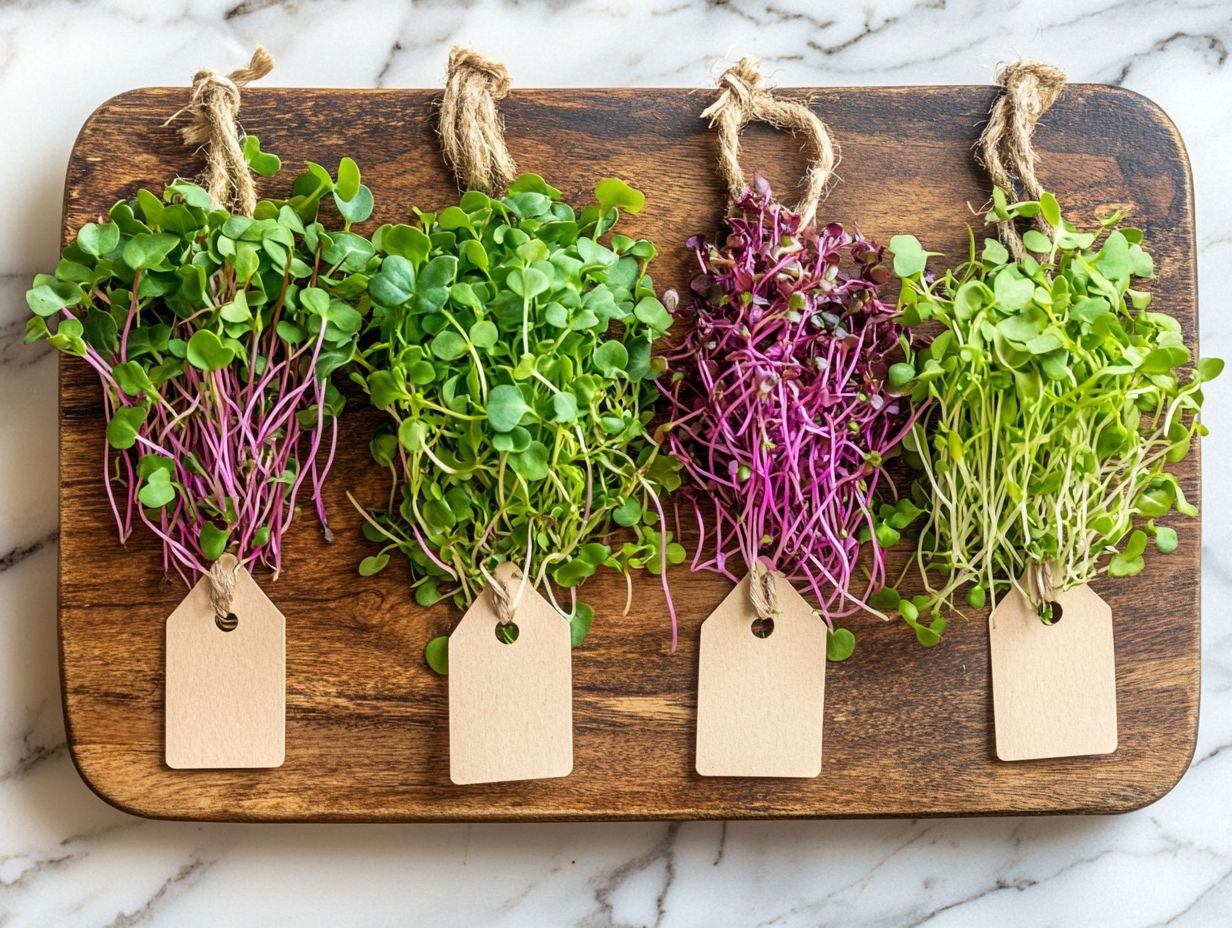
Wheatgrass microgreens are celebrated for their detox benefits. They re an excellent addition to any health-conscious diet.
This green powerhouse is rich in chlorophyll, vitamins, and minerals. It helps cleanse your body of toxins and restore balance.
You can enjoy wheatgrass in juices or smoothies for a refreshing boost. Whether in shot form or a colorful dish, it enhances both flavor and detox efforts!
8. Kale Microgreens
Kale microgreens deliver a powerful punch of antioxidants, vitamins, and nutrients, making them an outstanding choice for enhancing brain health and overall vitality.
These tiny greens are rich in vitamin K, which is crucial for cognitive function, and vitamin C, celebrated for its impressive antioxidant properties. They also contain high levels of omega-3 fatty acids and fiber, both essential for optimal brain health.
Don t miss out on these nutrient-packed microgreens! Here are some delicious ways to incorporate kale microgreens into your daily meals:
- Toss them into salads for a delightful crunch.
- Blend them into smoothies for an extra nutrient kick.
- Use them as a vibrant garnish on soups and entrees for added flavor and health benefits.
9. Cilantro Microgreens
Cilantro microgreens add a fresh burst of flavor to your dishes while offering a wealth of health benefits. These tiny greens are rich in antioxidants, which can help reduce heart disease risk factors.
Loaded with essential vitamins and minerals, cilantro microgreens support your cardiovascular health. With high levels of vitamins A, C, and K, they can enhance your immune function and improve cholesterol levels.
Incorporating these microgreens into your meals is simple. Sprinkle them atop salads, blend them into smoothies, or use them as a vibrant garnish for soups and tacos. Their versatility makes them a delightful addition to both cooked and raw dishes, elevating your culinary experience while enjoying their heart-healthy advantages.
10. Spinach Microgreens
Spinach microgreens are a treasure trove of iron and essential nutrients, making them an excellent choice for tackling iron deficiency and boosting cognitive function.
These petite greens fit seamlessly into a range of dishes. Whether you’re crafting a colorful salad, whipping up a refreshing smoothie, or enhancing a sandwich or omelet, they deliver a mild yet delightful flavor.
Rich in antioxidants and vitamins, spinach microgreens support overall wellness and brain health. Their high iron content increases oxygen flow to your brain, promoting improved focus and clarity.
Start adding spinach microgreens to your meals today for a healthier diet without compromising on taste.
11. Arugula Microgreens
Arugula microgreens are a delightful, peppery addition to your meals, offering high nutrient density and an abundance of antioxidants that support brain health and cognitive function.
These vibrant greens have a robust flavor, perfect for enhancing salads, sandwiches, and even smoothies. With their distinct zing, arugula microgreens elevate the visual appeal of your dishes and provide essential nutrients like vitamins A, C, and K, crucial for promoting overall wellness.
Rich in phytochemicals embraced by ancient culinary traditions for their health benefits, these microgreens serve as both a flavorful garnish and a nutrient-rich option. Incorporate them into your meals for a boost that may enhance your focus and memory, as highlighted in 5 ways microgreens promote mental clarity.
12. Beet Microgreens
Beet microgreens aren t just a feast for the eyes; they re brimming with antioxidants that fight inflammation, making them a fantastic addition to a healthy diet aimed at boosting cognitive function.
These tender sprouts offer a mild, earthy flavor that can elevate a range of dishes, from fresh salads to hearty sandwiches. Packed with essential vitamins A, C, E, and K, along with a generous dose of folate and fiber, they shine in the nutrition department.
Incorporating beet microgreens into your meals can enhance your heart health and aid digestion. Their vibrant color adds a touch of elegance; picture them sprinkled on a creamy soup, blended into a smoothie, or used as a garnish for quiches and grain bowls. These delicate greens enhance not just the taste but also the nutritional profile of your everyday recipes.
13. Mustard Microgreens
Mustard microgreens are celebrated for their distinctive flavor and remarkable levels of sulforaphane, which contribute to a wealth of health benefits, including support for brain health and powerful antioxidant properties.
These petite greens offer a delightful peppery taste that can elevate an array of dishes, from refreshing salads to hearty sandwiches. They are a preferred choice for both chefs and home cooks.
Their vibrant green hue and satisfying crunch enhance the visual appeal of your meals. They also provide a substantial nutritional boost, packed with vitamins A, C, K, and essential minerals, serving as a powerhouse for your overall well-being.
The sulforaphane present in mustard microgreens has garnered attention for its potential to combat oxidative stress, playing a vital role in preserving cognitive function and potentially fending off age-related decline. Consider incorporating these microgreens into your diet, especially the top 5 microgreens for smoothies, for a simple way to boost your health and energy.
14. Cabbage Microgreens
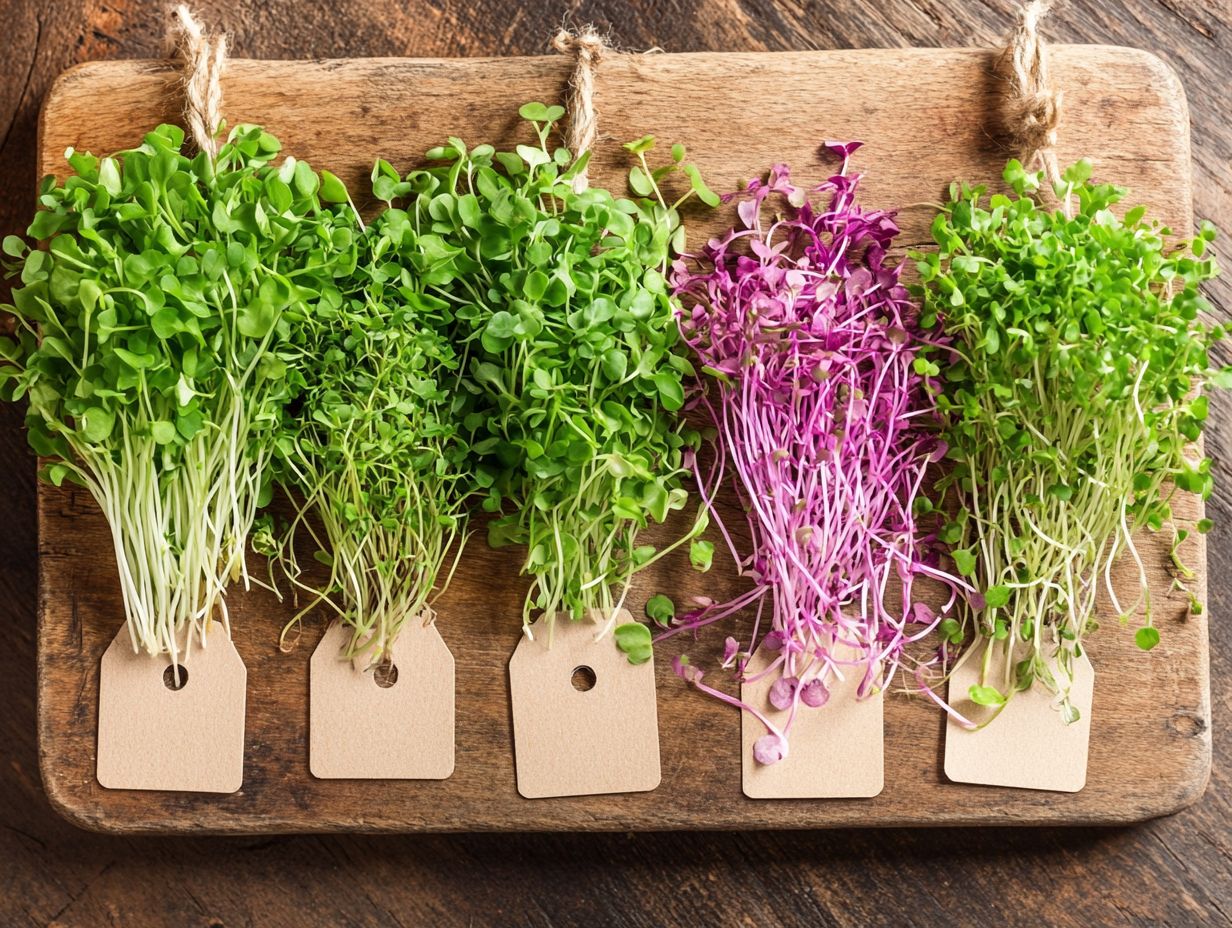
Cabbage microgreens offer a great source of nutrition, providing antioxidants and anti-inflammatory benefits that make them an excellent choice for anyone looking to enhance cognitive function.
These petite greens are brimming with essential vitamins like K, C, and E, along with a variety of minerals that contribute to your overall well-being. Their subtly peppery flavor adds a delightful twist to numerous dishes think salads, sandwiches, and smoothies enhancing both taste and nutrition.
Add cabbage microgreens to your meals and enjoy their gut and immune health benefits! Not only are these microgreens versatile and easy to cultivate, but they also stand out as a superfood and a great addition to your meals.
15. How to Incorporate Microgreens into Your Diet for Cognitive Benefits?
Incorporating microgreens into your diet is a simple yet impactful way to elevate cognitive function and promote brain health. These nutrient-dense plants can seamlessly enhance a variety of meals and snacks.
Try tossing nutrient-rich varieties like broccoli or kale microgreens into your fresh salad for a delightful crunch. This not only adds flavor but also delivers a significant boost of vitamins and antioxidants essential for mental clarity.
Alternatively, blending spinach or beet microgreens into your morning smoothie amplifies the flavor while increasing your intake of brain-boosting nutrients like folate and vitamin K.
Another effortless option is layering microgreens within sandwiches or wraps. The unique flavor and texture they bring can transform an ordinary meal into a gourmet experience, all while supporting your overall brain vitality.
With these simple adjustments to your daily meals, you can effortlessly enhance your nutrition and cognitive health.
What Are the Nutritional Benefits of Microgreens?
Microgreens are remarkably nutrient-dense, delivering a high concentration of vitamins, minerals, and antioxidants that are invaluable for your overall health.
Research reveals that these young plants boast significantly higher levels of certain nutrients compared to their mature counterparts. For example, studies show that varieties like broccoli and radish microgreens can contain up to 40 times more vitamin E and C, respectively, than their fully grown versions.
Experts often emphasize how the vibrant colors and flavors of microgreens reflect their rich phytochemical content, which plays a vital role in reducing inflammation and promoting heart health. Incorporating microgreens into your diet isn’t just a trend; it’s a smart and easy way to enhance your health.
How Do Microgreens Compare to Mature Greens in Terms of Nutritional Value?
Microgreens are not just your average greens; they often boast higher levels of vitamins, minerals, and antioxidants than their fully grown counterparts, making them a true nutritional powerhouse.
Recent studies have shown that these young plants, harvested right after their first leaves appear, can pack up to 40 times more nutrients than mature vegetables. For instance, research published in the Journal of Agricultural and Food Chemistry highlighted that red cabbage microgreens contain significantly more vitamin C and vitamin E compared to their mature versions.
Another study published in the International Journal of Food Sciences and Nutrition showed that microgreens are richer in specific plant chemicals that may help fight disease. By incorporating these nutrient-dense greens into your diet, including 5 microgreens to boost energy levels, you can elevate your overall health benefits while savoring exciting new flavors.
What Are the Other Health Benefits of Microgreens?
Beyond their impressive nutritional benefits, microgreens offer a wealth of health perks that include immune-boosting properties, anti-inflammatory effects, and support for cognitive function. These vibrant greens not only boost your immune system but also support your brain, making them a must-try!
These petite greens, brimming with vitamins, minerals, and antioxidants, serve as a powerhouse for anyone looking to elevate their diet. Rich in compounds that may help combat chronic inflammation, they can significantly alleviate symptoms associated with various health concerns.
Incorporating these vibrant plants into your meals does more than just enhance flavor; it also promotes overall wellness by aiding digestion and potentially reducing disease risk. As awareness of microgreens advantages continues to grow, more individuals are embracing these nutrient-dense varieties as a straightforward way to support their holistic health.
Are There Any Risks or Side Effects of Consuming Microgreens?
While microgreens are typically safe and beneficial, it’s essential to be mindful of potential risks and side effects, especially if you have certain health conditions. If your immune system is weak, you might be more likely to get foodborne illnesses, which can significantly impact brain health and overall nutrient absorption. This makes it crucial to wash your microgreens thoroughly before eating them.
Additionally, be aware that some microgreens, especially radish microgreens and mustard microgreens, can interact with medications, and interactions with certain healthy foods should be carefully monitored. If you’re on anticoagulants, you should approach those high in vitamin K, like kale microgreens, with caution.
To stay safe, buy microgreens from reputable suppliers or grow them at home. Always wash them well before eating. If you have health concerns, consult a registered dietitian or healthcare provider specializing in health-promoting diets to enjoy these nutrient-packed greens, rich in antioxidants and plant chemicals, while making the most of their remarkable health benefits.
How Can One Grow Their Own Microgreens to Boost Nutrient Density?
Growing your own microgreens at home is not just easy; it s a rewarding endeavor. Get ready to enjoy fresh, nutrient-packed greens that are known for their anti-inflammatory effects and ability to promote brain health. This allows you to enjoy their remarkable health benefits.
This straightforward gardening project fits seamlessly into even the tiniest of spaces. It’s perfect for everyone from passionate gardeners to busy urbanites. The allure of microgreens goes beyond their vibrant colors and delightful flavors; they are also bursting with vitamins and antioxidants that elevate any meal.
To embark on this journey, you ll want to choose seeds that thrive indoors, such as radish, fenugreek, or broccoli, which are known for their health benefits and nutritional composition. Crafting the ideal growing environment complete with adequate light, moisture, and temperature is essential to nurturing these greens. With just a bit of care and attention, you can cultivate an abundant harvest that not only enhances your dishes but also contributes to your overall well-being.
Frequently Asked Questions
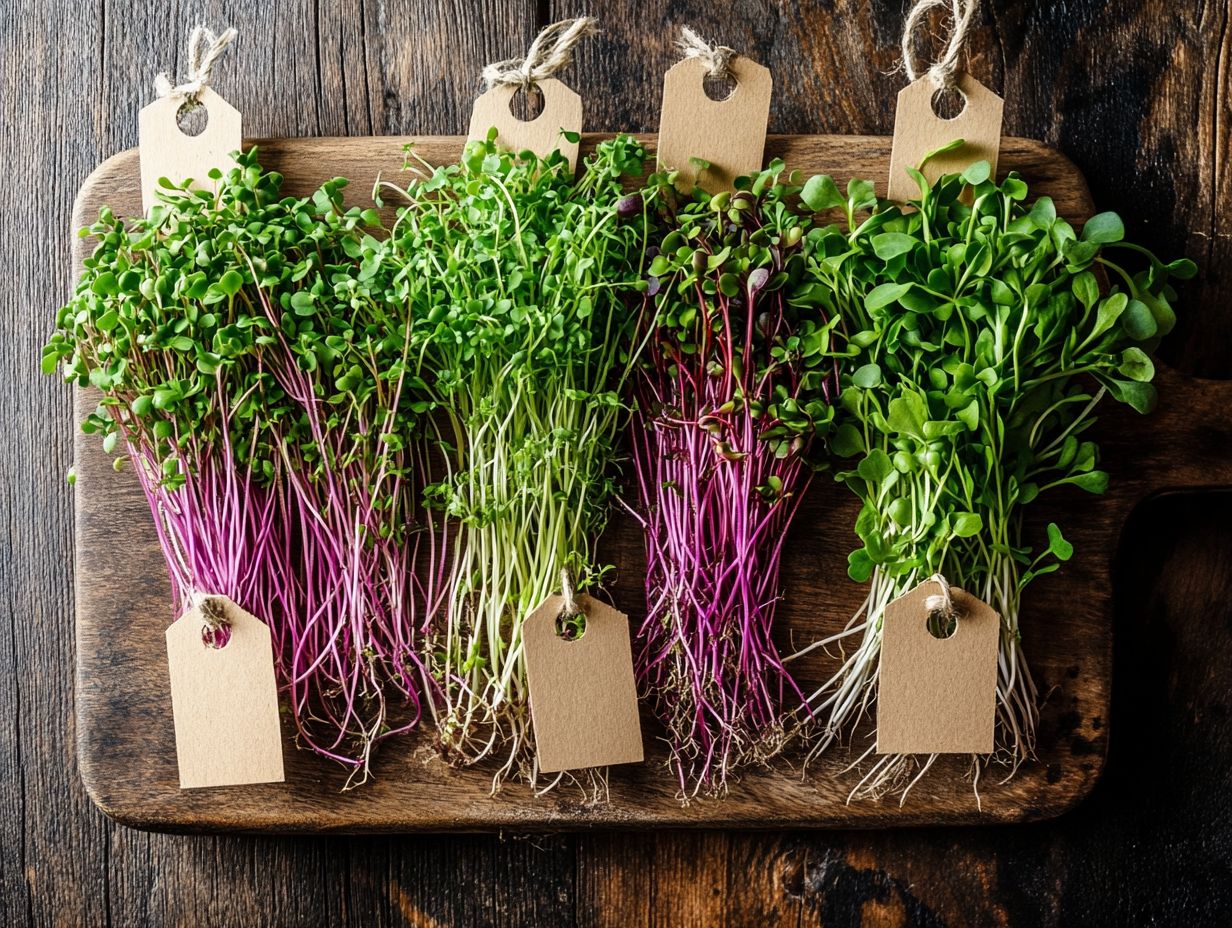
What are microgreens and how can they boost cognitive function?
Microgreens are young, edible plants that are harvested after the first true leaves have developed. They are known for their intense flavor and high concentration of nutrients, making them a great addition to any diet. Studies have shown that certain microgreens, such as broccoli and kale, contain compounds that can improve cognitive function.
Which 5 microgreens are recommended for boosting cognitive function?
The 5 microgreens that have been found to have the most significant impact on cognitive function are broccoli, kale, watercress, spinach, and red cabbage. These microgreens contain high levels of antioxidants and other nutrients that can protect and improve brain health.
How do antioxidants in microgreens help with cognitive function?
Antioxidants are substances that help protect our cells from damage. Free radicals are unstable molecules that can cause inflammation and oxidative stress, both of which are linked to cognitive decline. By consuming microgreens rich in antioxidants, we can help prevent this damage and improve cognitive function.
Yes, studies have shown that a diet rich in microgreens can slow down age-related cognitive decline. This is because microgreens contain nutrients, such as vitamin E, that can help protect and repair brain cells. The high levels of antioxidants in microgreens help prevent and even reverse damage caused by free radicals.
Are there any other benefits of consuming microgreens for cognitive performance?
In addition to boosting cognitive function, microgreens have been found to have other positive effects on the brain. They can improve memory, reduce brain fog, and enhance overall brain health. Microgreens can also improve mood and reduce symptoms of depression, which can indirectly impact cognitive function.
How can I incorporate microgreens into my diet to reap their cognitive benefits?
Microgreens are versatile and can be easily incorporated into a variety of dishes. They can be added to salads, sandwiches, smoothies, or even used as a garnish for soups and main dishes. You can also grow your own microgreens at home and add them to your meals for a fresh and nutrient-packed boost.

